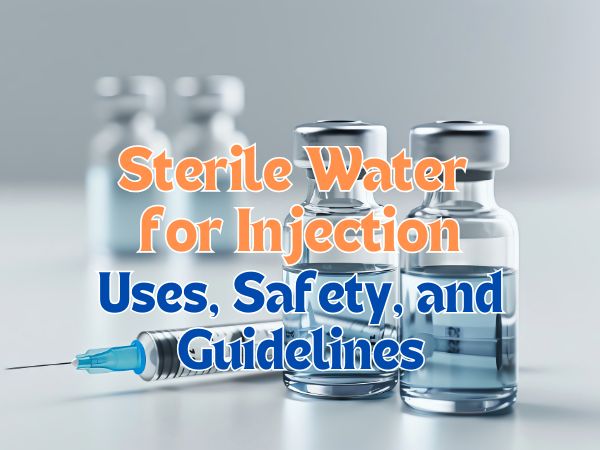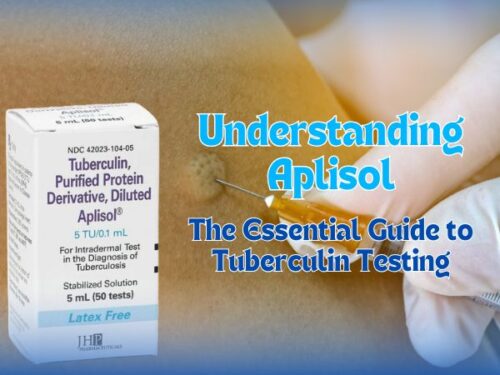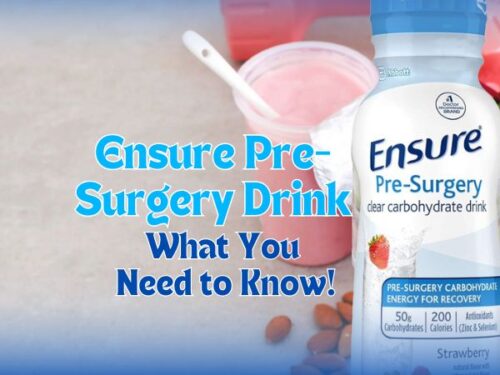Sterile Water for Injection: Uses, Safety, and Guidelines
Have you ever been injected with a medication via intravenous route? Your answer is probably yes as most of us have experienced taking injections or even drips. All of these medications are clear solutions prepared by loading the medication in sterile water for injection or, as it is often abbreviated, SWFI. The sterile water for injection, USP is extensively employed in healthcare owing to its safety and nonirritant nature. However, care should be taken while administering SWFI in home settings because of the associated risk of hemolysis.
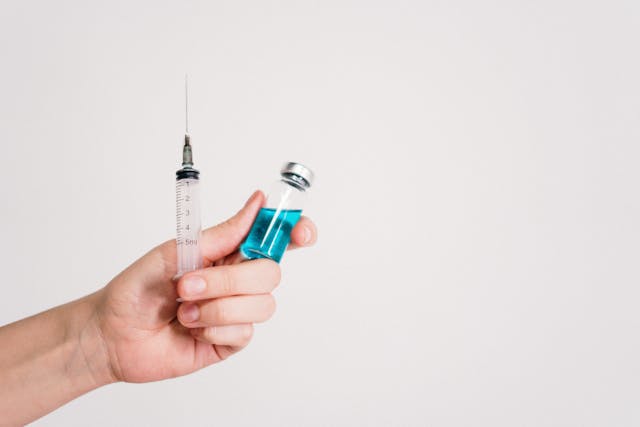
Sterile water for injection is employed for the preparation of IV formulations
In the following article, a thorough analysis of sterile water for injection has been presented in terms of what it is, how is it employed in healthcare, as well as how to use it to maximize safety.
What is Sterile Water for Injection?
The United States Pharmacopoeia (USP) defines sterile water for injection (SWFI) as a non-pyrogenic and distilled water that is employed for intravenous administration after a suitable solute has been added to it.
It comes in a single-dose container and can be employed as a diluent. The pH of sterile water for injection is 5.5 (always between 5.5 to 7.0) and its osmolarity is 0 mOsm/L. Moreover, it is free from preservatives as well as any kind of antimicrobial agents.
Importance of Sterility to Prevent Contamination
Sterility, as per the World Health Organization (WHO), refers to a state of complete absence of viable microbes. Despite being hard to achieve, sterile preparations pose the minimum risk of contamination. As a result, the patient remains safe from infections both in the wounded area/IV site and into the bloodstream.
To achieve this level of sterilization, many steps are necessary. For instance, an aseptic environment is essential around the facility where sterile preparations are being manufactured. Similarly, using sterile water for injection as a base for IV preparations assists the manufacturer in achieving fully sterilized pharmaceutical products.
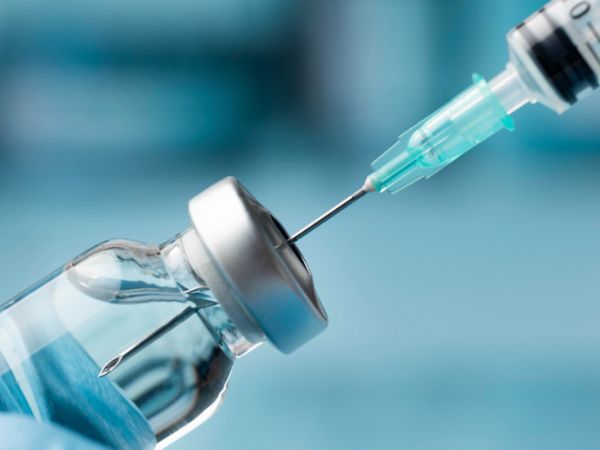
Sterility is extremely important when making solutions for vaccination
Role of SWFI in Medication Delivery
Sterile water for injection has several uses which include the following:
1. Fluid Replenishment
In the case of a patient with severe dehydration, sterile water for injection can be administered after the addition of suitable additives. This helps the body regain its lost minerals and electrolytes and renders it rehydrated.
2. Medication Delivery
Sterile water for injection is also an ideal vehicle for carrying medications directly into the bloodstream via intravenous route. This way, the gastrointestinal tract is bypassed and the medications are not degraded, a case often associated with oral drug delivery.
3. Nutrition Carrier
In patients who are not able to take food via the oral route due to surgery, coma, old age, etc., there is a need to administer nutrients intravenously. For this purpose, sterile water for injection is used. Suitable amounts of carbohydrates, proteins, and fats along with vitamins and minerals are loaded into the water and administered at a specified rate.
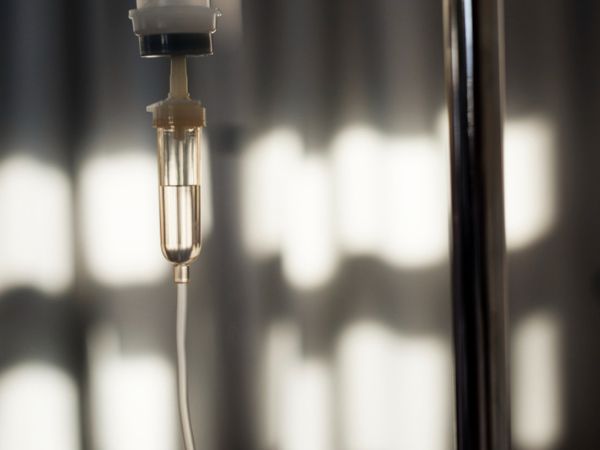
IV drips have sterile water for injection as their vehicle
Guidelines for Safe Handling and Administration in Hospitals and Home Settings
The sterile water for injection needs to be properly handled and administered. In this regard, the following instructions should be taken as a guideline:
- Always store the sterile water for injection at a temperature of 25°C. Do not expose the solution to heat.
- Before administering sterile water for injection, check the label on the plastic containers or bags. Particularly, look for an expiry date as well as the hypotonic/hypertonic/isotonic state.
- Do not use sterile water for injection, USP intravenously without adjusting its tonicity i.e. from hypotonic to isotonic. This needs to be done by the addition of solutes in suitable concentrations.
- Check the seal of sterile water for injection. Do not use sterile water for injection if the seal is not intact.
- While adding suitable solutes, make sure to practice the aseptic technique to avoid contamination.
- Always visually inspect the solutions before administering them. In the case of undissolved particles visible to the naked eye, the solution is not ready yet for IV delivery, and further mixing is required.
- Do not use sterile water for injection if the solution has discoloration.
- Once the needed amount has been withdrawn from the container, discard the remaining SWFI immediately.
Caution
Due to its hypotonic nature, sterile water for injection USP acts as a hemolytic agent. It means that when it is administered on its own without adjusting its tonicity from hypotonic to approximately isotonic by the addition of sufficient solute, the water enters the blood cells and breaks them. Therefore, it should never be administered on its own or used for drinking purposes. In some cases, hemolysis can also be associated with hemoglobin-induced renal failure.

IV preparations deliver essential medicines to the body at a faster rate
IV Solutions at Health Supply 770: Features and Specifications
Intravenous or IV solutions are employed in almost every hospitalized patient. These are a great way of delivering medications, nutrients, vitamins, electrolytes, as well as minerals to the body that have been lost owing to their disease state.
IV solutions are of different types and use sterile water for injection as their vehicle. Some of these IV fluids are available at Health Supply 770 and have been detailed below along with their features and purchase links:
B. Braun L8000 Replacement Preparation Sodium Chloride, Preservative Free 0.9% IV Solution Flexible Bag 1,000 mL 12 EA/CA
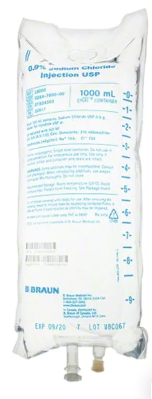
US$529.88
Product Details
Braun L8000 replacement preparation is a product employed for electrolyte delivery to the body via intravenous route. The product is composed of sodium chloride in a concentration of 0.9% and has sterile water for injection as its base. Because of this particular percentage composition, the solution is referred to as normal saline.
Moreover, the absence of any preservatives, antimicrobial agents, as well as additives makes the product safe for use in all patients. These B. Braun L8000 replacement preparation solutions can either be administered on their own for the replenishment of lost electrolytes or can be taken as a vehicle for the delivery of medications or nutrients.
B. Braun L5101 Dextrose Water 5% IV Solution Flexible Bag 500 mL CS/24
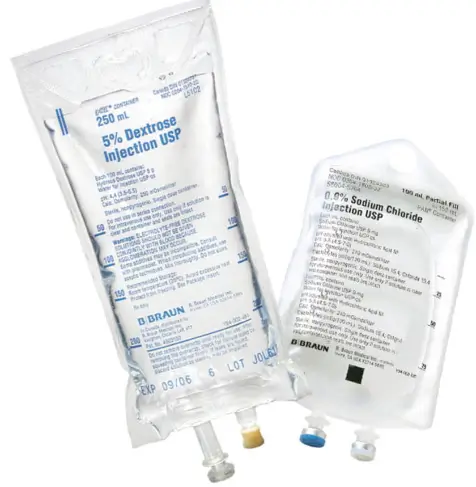
US$377.88
Product Details
Braun L5101 dextrose water 5% IV solution is a caloric agent that is prepared by dissolving 5 grams of dextrose per 1000 ml of sterile water for injection. Being a caloric agent, the dextrose can be metabolized by the body, and energy is produced. Therefore, the solution is ideal for people who have severe dehydration or very low blood sugar levels.
The B. Braun L5101 dextrose water 5% IV solution comes in a 500 ml flexible plastic bag. The packaging material is nontoxic and therefore does not release any harmful substances into the product.
B. Braun L7500: Lactated Ringer’s Solution IV 1000 mL CS/12
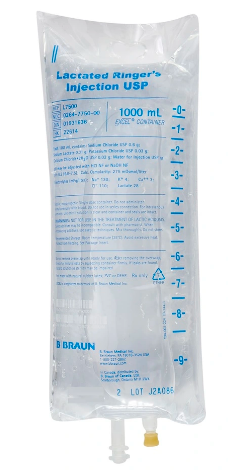
US$533.33
Product Details
Braun L7500 lactated Ringer’s solution is one of the best IV solutions used in healthcare facilities. This is composed of multiple salts i.e. sodium chloride, potassium chloride, as well as sodium lactate. All three of these are added into sterile water for injection until a homogeneous solution is prepared.
Lactated Ringer’s solution is often employed for the management of severe dehydration, gastrointestinal issues, as well as fluctuating levels of BGL, especially in diabetics. The IV solution is available in a 1000 ml flexible bag. Being prepared from safe plastic material, the plastic does not leach into the solution. In addition, the product is sterile and does not contain preservatives or additives.
Grifols 729620 IV Sterile Water Injection Solution Sodium Chloride 0.9% 500mL Bag 20 EA/CS
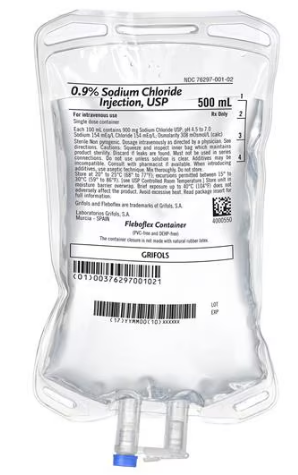
US$579.88
Product Details
Grifols 729620 IV injection solution is normal saline i.e. it has 0.9% sodium chloride dissolved in sterile water for injection. The absence of preservatives and additives renders it completely sterile and safe. In addition, the packaging material is also free from toxic chemicals like PVC, natural rubber latex, or Di-(2-ethylhexyl) phthalate or DEHP.
Baxter 2F7122 Irrigation Solution 0.9% Sodium Chloride (24/CS)
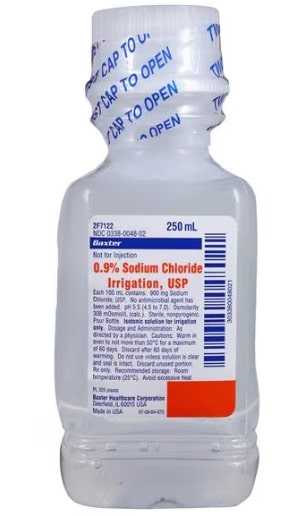
US$314.88
Product Details
Baxter 2F7122 irrigation solution, USP is sterile and is often employed for rinsing and washing wounds. It has 0.95 sodium chloride. The solution is packed in a plastic-based bottle of 250 ml capacity. The pH value of the solution is between 4.5 to 7.0.
Being an irrigation solution, the product is specified for wound care and is not to be administered intravenously nor should be consumed orally. As for the osmolarity value, Baxter 2F7122 irrigation solution, USP has a value of 308 mOsm/L. The product is dispensed in a plastic bottle which is non-leaching.
B. Braun R5001-01 Irrigation Solution Water 500mL Plastic Injection Container 16 EA/CA
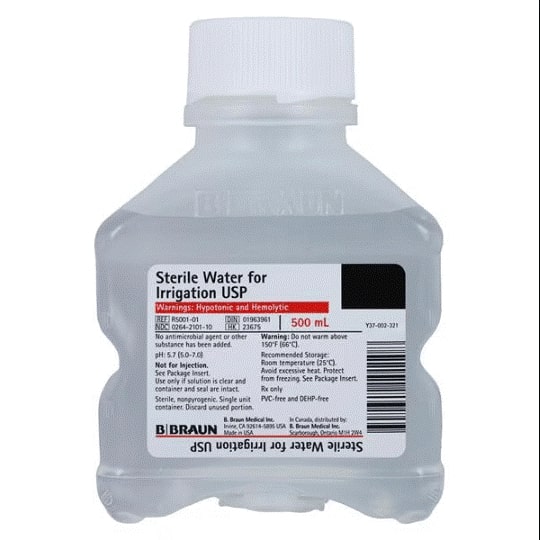
US$344.88
Product Details
Braun R5001-01 irrigation solution contains sterile water for injection as its vehicle. The product is safe for use because of is free from PVC, DEHP, as well as natural rubber latex which are common irritants found in plastic containers carrying IV solutions. The capacity of the product is up to 500 ml and 16 containers are available at the above-mentioned price.
B. Braun R5200-01 Irrigation Solution 0.9% Sodium Chloride, Preservative Free Not for Injection Bottle 1,000 mL
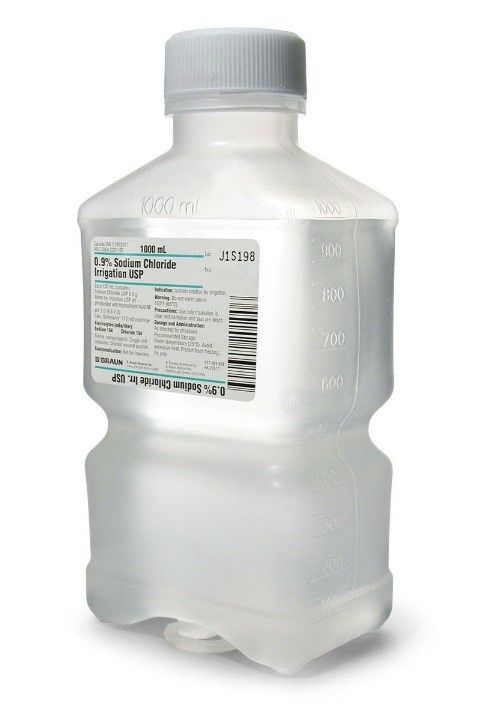
US$374.88
Product Details
Braun R5200-01 irrigation solution, like the previous ones, is employed for wound care in hospitals as well as in home settings. Chemically, the solution has 0.9% sodium chloride loaded in sterile water for injection. The product is safe for IV administration as it is free from preservatives and other additives. The capacity of each container of B. Braun R5200-01 irrigation solution is up to 1000 ml.
*Note: The prices mentioned in the article are taken from the Health Supply 770 website. These may vary over time.
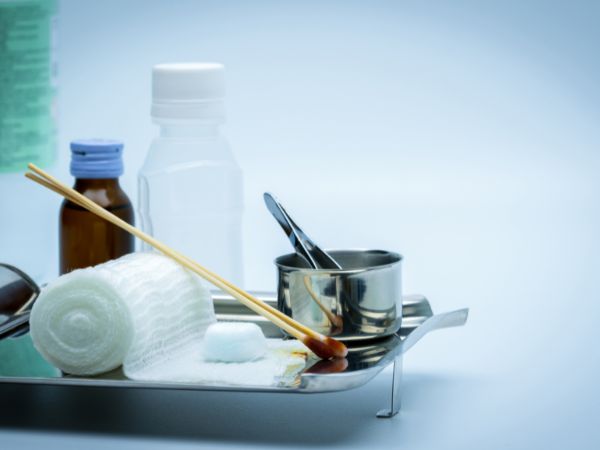
Irrigation solutions are employed for wound care
The different types of sterile water for injection-based-IV solutions mentioned in the article, along with many other medical supplies, can be ordered from Health Supply 770, a reliable name when it comes to medical products. We have a 30-day money-back guarantee and provide your products to you in the shortest possible time. Click the links given in the article to check out the wide range of IV solutions.
Bottom Line
Intravenous solutions need to be sterile to ensure their safety. For this purpose, each ingredient has to be completely free from microbes. In addition, the absence of preservatives is also a necessity. Therefore, sterile water for injection is employed for preparing IV solutions.
The uses of sterile water for injection are many as it finds applications as a diluent for medications as well as vehicle nutritional substances. Therefore, sterile water for injection is extremely useful in healthcare facilities and in-home settings.
For purchasing the different types of IV solutions prepared by sterile water for injection, reliable vendors like Health Supply 770 should be approached. They ensure the provision of quality products along with satisfactory services.

PhD Scholar (Pharmaceutics), MPhil (Pharmaceutics), Pharm D, B. Sc.
Uzma Zafar is a dedicated and highly motivated pharmaceutical professional currently pursuing her PhD in Pharmaceutics at the Punjab University College of Pharmacy, University of the Punjab. With a comprehensive academic and research background, Uzma has consistently excelled in her studies, securing first division throughout her educational journey.
Uzma’s passion for the pharmaceutical field is evident from her active engagement during her Doctor of Pharmacy (Pharm.D) program, where she not only mastered industrial techniques and clinical case studies but also delved into marketing strategies and management skills.










